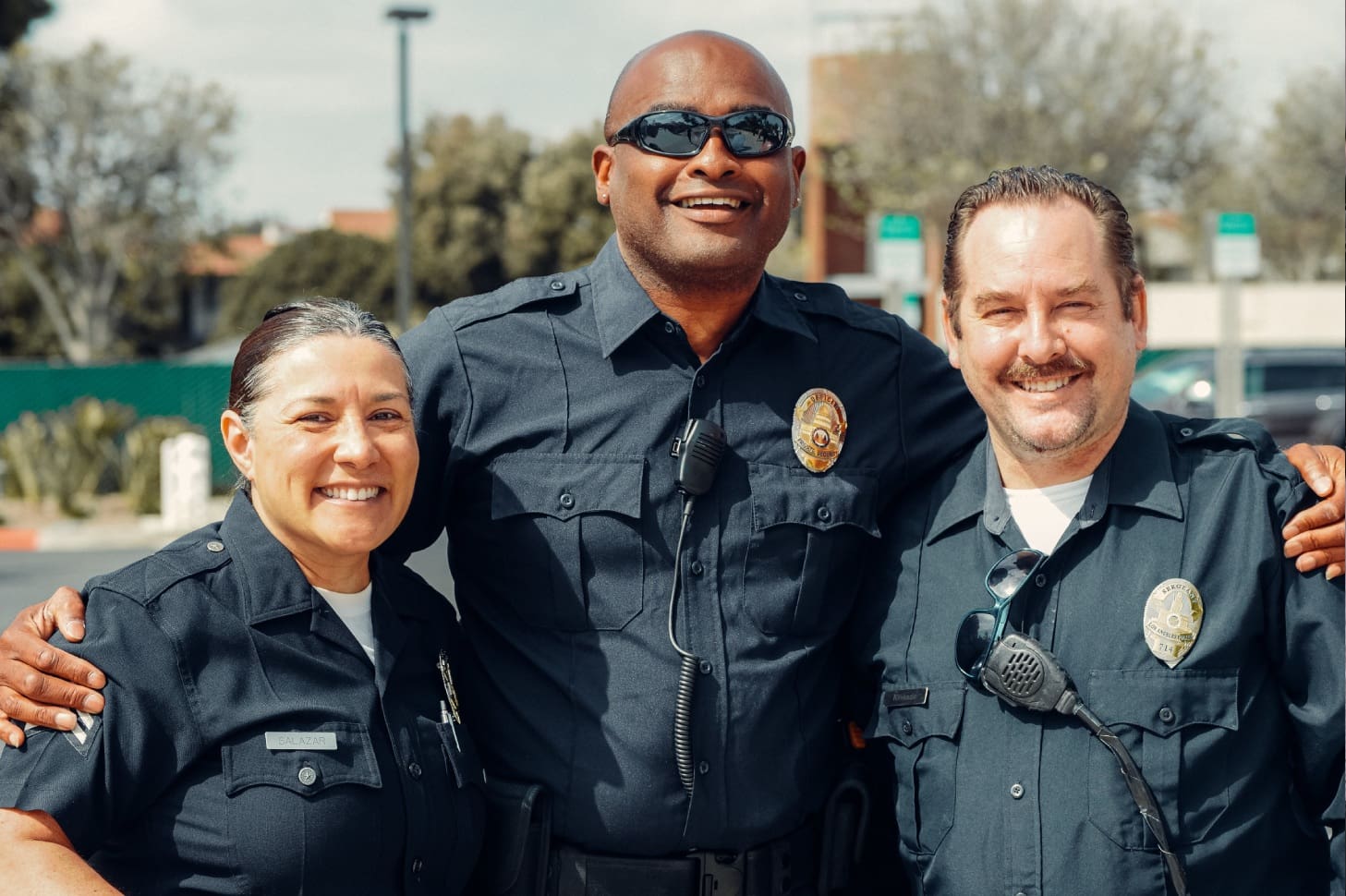
What We Do
VALEAP is here to help. As an organization, VALEAP is not sponsored by any particular agency, but is supported by many. In most cases, our staff volunteer their time, because they are dedicated to helping others. No one understands cops like other cops. We answer the call because we, too, know what it is like to face the many hazards of a life in law enforcement.
VALEAP’s Post Critical Incident Seminar (PCIS) retreats are modeled after a highly effective, peer driven program developed by the FBI. The three-day retreats consist of conversations, workshops, therapy, and evening fellowship. To learn more about these events, click here. VALEAP has hosted 30 Virginia PCISs to date and has served over 1,100 law enforcement officers and other first responders from all over the commonwealth and around the country.
VALEAP is also building a network of trained peers to support individuals in their departments day-to-day, when incidents occur, and at PCIS retreats. You can learn more about Critical Incident Stress Management (CISM) training here.
VALEAP‘s Couple’s Enrichment Seminar offers an oceanfront weekend getaway for law enforcement officers and their spouses, partners, and significant others. This seminar helps to build communicative skills and foster a strong foundational understanding of how the nature of the career can affect marital life. To learn more about the CES, please contact our operational Director.
Post Critical Incident Seminars
What is PCIS?
Law enforcement officers across the Commonwealth of Virginia are exposed to high stress on a daily basis, but from time to time encounter extraordinarily traumatic situations. Over 20 years ago, the FBI developed a highly effective program for post-incident training in critical incident stress. PCIS has literally meant the difference between staying on the job and leaving law enforcement due to unresolved effects of critical incident stress.
Law enforcement professionals attending PCIS will have an unparalleled opportunity to share their experiences with peers and to offer and receive valuable support. Participants find that discussing their experiences with fellow officers who have been down similar paths facilitates normalization and recovery. Attendees will also have access to mental health professionals who work closely with law enforcement and understand the challenges of the profession. PCIS will provide education on trauma, identify effective patterns of resolution, and offer proven coping strategies to promote recovery and resilience.
In 2009, Virginia Law Enforcement hosted the first Virginia Law Enforcement PCIS, developed carefully around a proven model utilized for more than fifteen years in North and South Carolina. PCIS is offered to law enforcement professionals, 911 telecommunications, and their spouses or significant others.

Critical Incident Stress Management
The Virginia Law Enforcement Assistance Program offers Critical Incident Stress Management services (CISM) to law enforcement personnel. Our Law Enforcement Peer Support Team will coordinate services at a location convenient for the requesting agency or individual(s) and can provide immediate peer support of personnel, assess need for Defusing, Debriefing or both. A Defusing is a brief meeting, typically 30 to 60 minutes, intended to stabilize people affected by a critical incident so that they may return to normal routines. These meetings will normally take place 3-8 hours following the event, prior to personnel being released to return home. During the next few days, the requesting party will work very closely with VALEAP’s peer team to plan appropriate crisis intervention. A typical Peer Support Team consists mainly of sworn law enforcement and a mental health professional; law enforcement chaplains frequently participate in the process as well. All responding team members will be trained in crisis intervention. The Virginia Law Enforcement Assistance Program offers Critical Incident Stress Management (CISM) services to law enforcement personnel. Our Law Enforcement Peer Support Team will coordinate services at a location convenient for the requesting agency or individual(s). It can provide immediate peer support to personnel to assess the need for Defusing, Debriefing, or both. A Defusing is a brief meeting, typically 30 to 60 minutes, intended to stabilize people affected by a critical incident so that they may return to normal routines. These meetings will normally occur 3-8 hours after the event, before personnel are released to return home. During the next few days, the requesting party will work very closely with VALEAP’s peer team to plan appropriate crisis intervention. A typical Peer Support Team consists mainly of sworn law enforcement and a mental health professional; law enforcement chaplains frequently participate in the process as well. All responding team members will be trained in crisis intervention. The Virginia Law Enforcement Assistance Program follows a model of crisis management known as The Mitchell Model, named for Jeffrey Mitchell, Ph.D. More information on this stress management model is available on the website for the International Critical Incident Stress Foundation found at: www.icisf.org.
What is a Critical Incident?
There is no clear definition of a critical incident or event; frequently that designation falls to the individual(s) who experienced it. There are some common event types that qualify as critical incidents, which may include:
Line of Duty Death of an Officer
Suicide of an Officer/Family Member
Multi-Casualty Incident/Disaster
Significant Event Involving Children
Knowing the Victim of an Event
Serious Line of Duty Injury
Law Enforcement Shooting Incident
Excessive Media Interest
Prolonged Incident With Loss
Any Significant Event Involving Law Enforcement
Ten Specific Elements of CISM
The structure of Critical Incident Stress Management response is often unique to each event, just as no two events are truly the same. VALEAP’s Peer Support Team will work with requesting agencies or individuals to custom-tailor a response. The elements of CISM response are listed below, and may be used in countless combinations to suit a given situation.
To request VALEAP-facilitated CISM services or to learn more about becoming a team member, please contact Adam Blevins. Adam’s information may be found on the CONTACT US tab above.
CISM Training
VALEAP is pleased to host/sponsor International Critical Incident Stress Foundation (ICISF) Critical Incident Stress Management Training, also known as peer training. The 4-day or condensed 3-day GRIN training includes two ICISF courses – the Group Crisis Intervention course and the Assisting Individuals in Crisis course. Additionally, VALEAP is pleased to host Psychological Body Armor, another ICISF course.
***Students must attend the entirety of the ICISF training in order to receive credit for the course.
The typical ICISF registration fee for this course is $525.00, but we are glad to be able to bring it to you at no cost. Virginia law enforcement officers, dispatchers, and members of Virginia police CISM/peer teams may attend this training at no cost.
Registration is capped at 50 participants.
Questions concerning Virginia Law Enforcement Assistance Program or training content may be directed to Adam Blevins at adamblevins.valeap@gmail.com or (540) 817-9736.
ICISF Assisting Individuals in Crisis
Course Description
Crisis Intervention is NOT psychotherapy; rather, it is a specialized acute emergency mental health intervention which requires specialized training. As physical first aid is to surgery, crisis intervention is to psychotherapy. Thus, crisis intervention is sometimes called “emotional first aid”. This program is designed to teach participants the fundamentals of, and a specific protocol for, individual crisis intervention. This course is designed for anyone who desires to increase their knowledge of individual (one-on-one) crisis intervention techniques in the fields of Business & Industry, Crisis Intervention, Disaster Response, Education, Emergency Services, Employee Assistance, Healthcare, Homeland Security, Mental Health, Military, Spiritual Care, and Traumatic Stress.
Program Highlights
Continuing Education Information:
Completion of “Assisting Individuals in Crisis” and receipt of a certificate indicating full attendance (13 Contact Hours) qualifies as a class in ICISF’s Certificate of Specialized Training Program.
Learn how to treat yourself like someone you are responsible for helping.
Outline: PSYCHOLOGICAL BODY ARMOR™ (PBA)
I. Introduction to PBA
- Definition and Concept
- Relation to Psychological Immunity
- Objectives of the Course
II. Core Elements of PBA
- Protection Against Stress and Psychological Injury
- Facilitation of Resilience and Accelerated Healing
- Integration of Psychological and Physical Elements
III. Components of PBA
A. Resilient Attitudes
- Foundation of PBA
B. Physical Aspects
- Exercise: Strengthening PBA
- Nutrition: Fueling PBA
- Rest/Sleep: Restoring PBA
C. Social Connection
- Role as a Force Multiplier
- Impact on Adversity and Happiness
- Involvement of Friends, Co-workers, Family
D. Spiritual Aspect
- Transcendence through Belief
IV. Course Objectives and Outcomes
- Understanding the Nature of PBA
- Creating a Personal PBA Profile
- Strengthening, Fueling, and Restoring PBA
- Expanding PBA through Interpersonal Support
- Relating Spirituality to PBA
- Developing a PBA Plan with 36 PBA Rx

Public Safety CISM Protections Under Virginia Law
The Code of Virginia provides specific protections for law enforcement professionals participating in stress management program services. These protections ensure that communications are held confidential by peer team members, clinicians, and other participating team members. Please read the attached section for a full description and applicable exemptions.
§ 19.2-271.4. Privileged communications by certain public safety personnel.
A person who is a member of a critical incident stress management or peer support team, established pursuant to subdivision A 13 of § 32.1-111.3, shall not disclose nor be compelled to testify regarding any information communicated to him by emergency medical services or public safety personnel who are the subjects of peer support services regarding a critical incident. Such information shall also be exempt from the Virginia Freedom of Information Act (§ 2.2-3700 et seq.).
A person whose communications are privileged under subsection A may waive the privilege.
The provisions of this section shall not apply when:
For the purposes of this section, “critical incident” means an incident that induces an abnormally high level of negative emotions in response to a perceived loss of control. Such an incident is most often related to a threat to the well-being of the emergency medical services or public safety employee or to the well-being of another individual for whom such employee has some obligation of personal or professional concern.
2012, cc. 148, 320; 2017, c. 609.
Training Opportunities
VALEAP, ICISF CISM Basic training. Assisting Individuals in Crisis, Group Crisis Intervention, and Psychological Body Armor. VALEAP offers several peer certification courses annually. To view currently scheduled training opportunities, please visit the upcoming events tab. To schedule or host a CISM basic course with VALEAP instructors, please contact Adam Blevins at adamblevins.valeap@gmail.com. DCJS Inservice credits awarded to participants.
VALEAP offers many blocks of training at several CIT schools, in-service trainings, conferences, and many more upon request. For additional information and to request a block of training from a VALEAP instructor, please contact Adam Blevins at adamblevins.valeap@gmail.com.
Mental Health, Suicide Awareness and Intervention Training
We are pleased to offer Mental Health First Aid (c) training for our VALEAP-affiliated peers. Mental Health First Aid is an internationally acclaimed best practice model which provides participants with mental health awareness education and basic skills for interacting with individuals in mental health crisis. The class is 8 hours in length and participants will receive a certificate of completion. VALEAP has not yet requested DCJS credit for course completion.
If you are interested in attending a Mental Health First Aid course, please contact Kit Cummings at kitcummings.valeap@gmail.com.
For more information regarding Mental Health First Aid, please visit http://www.mentalhealthfirstaid.org/cs/

